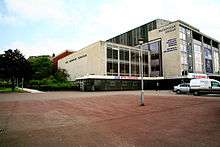Ashcroft Theatre
 | |
| Address |
Park Lane, Croydon London |
|---|---|
| Coordinates | 51°22′20″N 0°05′43″W / 51.3722°N 0.0953°W |
| Owner | Croydon London Borough Council |
| Operator | Fairfield Halls |
| Capacity | 749 |
| Website | |
| www.fairfield.co.uk | |
The Ashcroft Theatre is a theatre located within the Fairfield Halls, Croydon, South London. The theatre was named after Croydon-born Dame Peggy Ashcroft and is a proscenium theatre with a stepped auditorium. The mural on its fire curtain is by the artist Henry Bird.[1] A variety of productions are held throughout the year such as drama, ballet, opera and pantomime. The venue has a seating capacity of 763 and can be converted into a cinema as it has a large screen giving full Cinemascope and standard film format.[2]
The Ashcroft Theatre was opened on 5 November 1962 by Dame Peggy Ashcroft. The opening ceremony included the reading of a monologue specially penned by Sir John Betjemen called ‘Local Girl Makes Good'. The first play was ‘Royal Gambit' starring Dulcie Gray.[3]
The auditorium is on two tiers with the stalls heavily raked. The front of the circle is unadorned and the straight walls have natural finishes. The stage, with false proscenium, is well equipped with 30 single purchase counterweight sets for flying, and an orchestra pit on a hydraulic lift which can accommodate up to 16 players. Alterations to the forestage were undertaken to lessen the barrier provided by the original Juliet balcony and side door structures.[4]
Again there's a long list of names that have trodden the boards at The Ashcroft Theatre and these include Richard Todd, Rex Harrison and Dame Peggy herself.[5]
Safety Curtains go way back to the days of gas lighting and were meant to stop a fire onstage or backstage spreading to the auditorium. The Ashcroft Curtain was painted in 1982 by an artist called Henry Bird. A Northampton-based artist famous for his murals and curtains. He died in 2000 aged 90.[6]
There are many details, symbols and meanings in the curtain and they include references to the days of the Croydon Fair, the travelling players, famous artistic Croydonians and old English customs.[7]
References
- ↑ http://www.turnipnet.com/atc/safetycurtain.htm Henry Bird and his Theatrical Mural on the Ashcroft Theatre Safety Curtain, Croydon
- ↑ "Ashford Theatre Technical Specifications" (PDF). Retrieved 2008-02-04.
- ↑ "Fairfield at 50".
- ↑ "Fairfield at 50".
- ↑ "Fairfield at 50".
- ↑ "Fairfield at 50".
- ↑ "Fairfield at 50".
